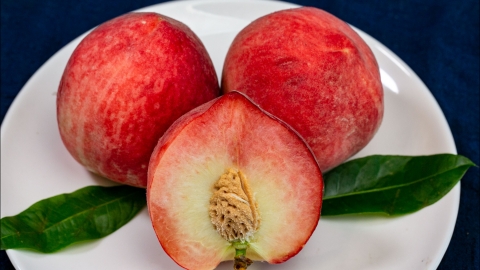Peach's Nutritional Value, Efficacy, and Functions
Peaches generally have nutritional value including vitamin C, dietary fiber, potassium, iron, and carotene. Their common functions and effects usually include energy replenishment, skin nourishment, digestion promotion, appetite enhancement, and hydration.

I. Nutritional Value
1. Vitamin C
Peaches contain a certain amount of vitamin C, with approximately 7 mg per 100 grams. Vitamin C has antioxidant properties, helping to remove free radicals in the body, reducing oxidative damage, delaying aging, promoting collagen synthesis, maintaining skin elasticity, enhancing immunity, and assisting the body in resisting external pathogens.
2. Dietary Fiber
Peaches are rich in dietary fiber, especially in the skin. Dietary fiber promotes intestinal motility, helps prevent and relieve constipation, and reduces the risk of intestinal diseases. It also increases satiety, aids in weight control, and has a supportive effect on lowering cholesterol levels.
3. Potassium
Peaches are a good source of potassium, containing approximately 166 mg per 100 grams. Potassium helps maintain normal heart function by regulating heart rhythm and promoting heart health. Additionally, it assists in maintaining the body's acid-base balance, participates in muscle contractions, and plays an important role in normal muscle function.
4. Iron
Peaches contain a small amount of iron, which is relatively prominent among fruits. Iron is an essential component for hemoglobin synthesis, helps prevent iron-deficiency anemia, ensures normal oxygen transport and energy metabolism in the body, and maintains the normal functioning of various organs.
5. Carotene
Peaches contain a certain amount of carotene, which can be converted into vitamin A in the body. Vitamin A is crucial for eye health, maintaining normal vision, especially in night vision, helping prevent night blindness, and positively contributing to the integrity of skin and mucous membranes.
II. Functions and Effects
1. Energy Replenishment
Peaches are rich in carbohydrates such as glucose and fructose, which can quickly be converted into energy after consumption, alleviating physical fatigue, restoring vitality, meeting daily activity needs, and are especially suitable for consumption after exercise or when the body is weak.
2. Skin Nourishment
Peaches contain antioxidant components such as vitamin C and carotene, which can reduce free radical damage to the skin, promote collagen synthesis, keep the skin moisturized and smooth, delay skin aging, and help maintain good skin condition.
3. Digestion Promotion
The dietary fiber in peaches promotes intestinal motility, increases stool volume, accelerates food digestion, absorption, and excretion, improves the intestinal environment, makes digestion smoother, and helps maintain good gastrointestinal function.
4. Appetite Enhancement
Peaches have vibrant colors, pleasant aromas, and a sweet-tart flavor that stimulates taste buds, enhances appetite, and improves enjoyment of eating, especially when appetite is low.
5. Hydration
Peaches have a high water content, which helps replenish bodily fluids, maintain water balance, alleviate thirst, and serve as a delicious option for hydration during hot weather or when the body is dehydrated.
Peaches are not only nutritionally rich but also offer multiple health benefits. It should be noted that although peaches have many benefits, they should be consumed in moderation, especially by individuals with diabetes, who should monitor their intake due to the natural sugars present in peaches.




